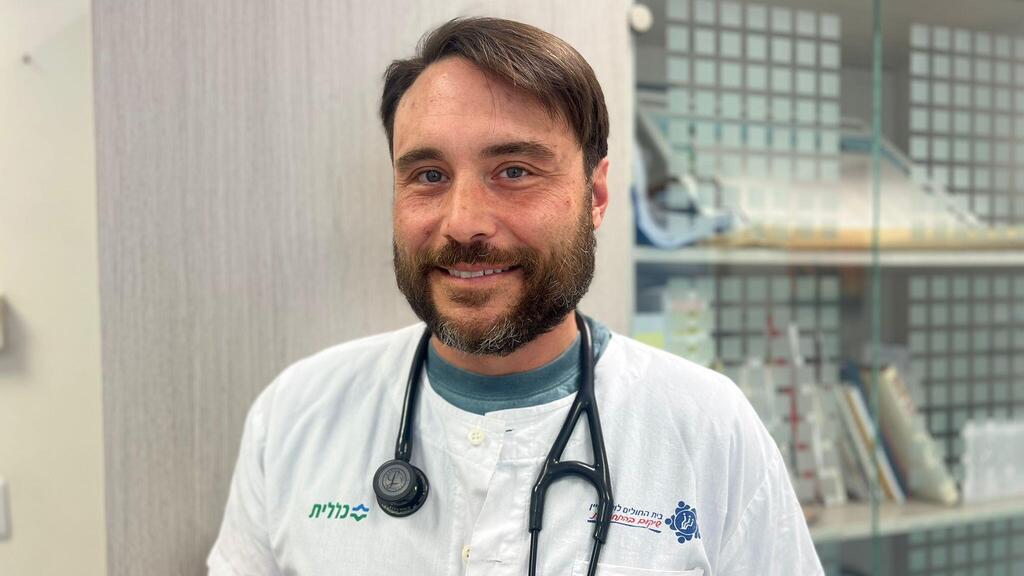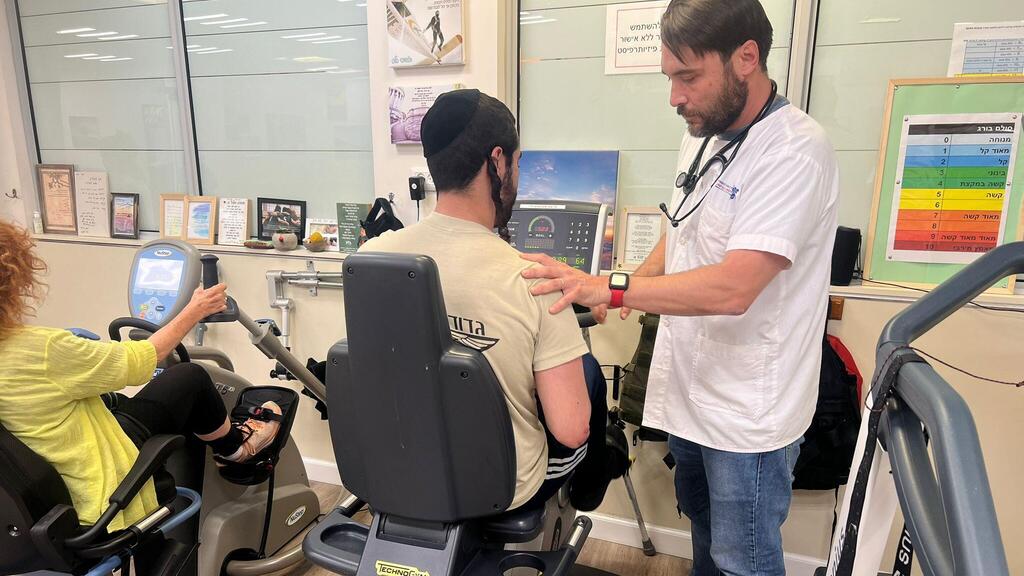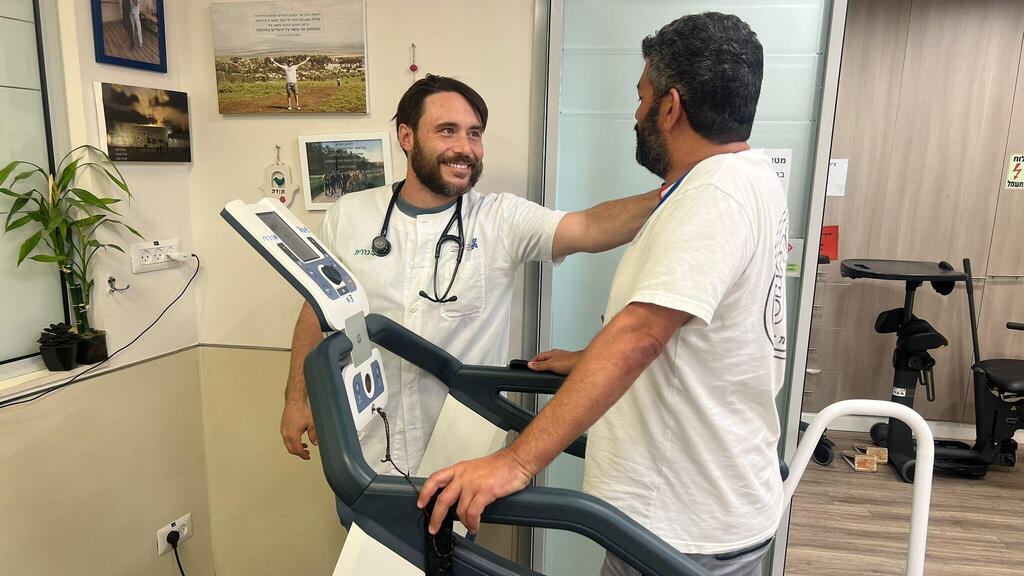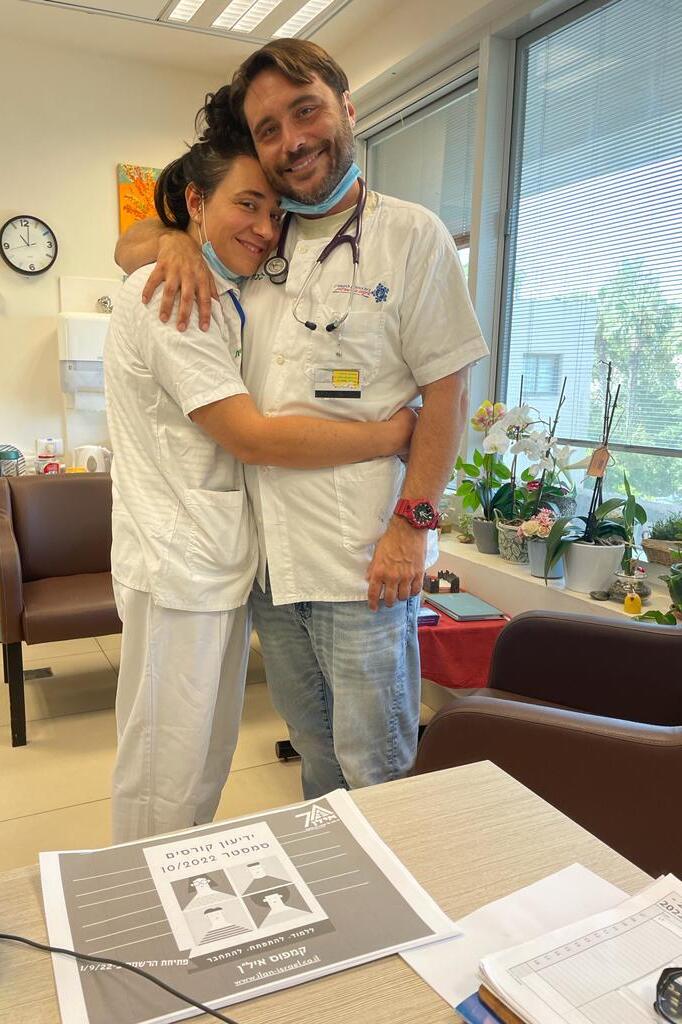Getting your Trinity Audio player ready...
Nine years ago, Dr. Robyn Bornstein faced a crossroads in his personal and professional life. As a third-generation member of a prestigious family of doctors in the United States, a considerable amount of pressure rested on the young physician's shoulders after he had recently completed his medical studies.
His father was a renowned internist and gastroenterologist, counting former U.S. President Donald Trump among his long-standing patients. The path to a promising career in the U.S. seemed clear, but Bornstein felt the need for a change. Ultimately, he decided to follow his heart. Despite never having visited Israel, he left everything behind, moved to the country and, at the age of 35, built a new life for himself in the Jewish state. Today, nine years later, he's a rehabilitation physician at Loewenstein Hospital responsible for treating injured soldiers, and says he can't think of living anywhere else.
"I had just finished all my rotations and licensing exams in the U.S. and couldn't find something I really wanted to do. It was a bit of a tough time," Bornstein says in recounting the series of events that led him to move to Israel.
"Then I had a conversation with a friend and she told me she thought I should move to Israel. I had never been here and thought it was a bit extreme. I only knew what was said in the news. It stayed in my mind a bit, and eventually I decided to come. My dad's cousin is Michael Oren, who was Israel's ambassador to the U.S., so I had family here."
Bornstein arrived in Israel and made efforts to become an ordinary Israeli citizen. "I was in an ulpan [Hebrew school] in Kiryat Yam; it was really nice," he recalls. "Except for a few blessings I said at my bar mitzvah, I didn't know Hebrew. I really started from the very basics, and slowly succeeded."
Shortly after, he was accepted for an internship at the Rabin Medical Center. During this period, he had the opportunity for a two-month rotation elsewhere and, at the recommendation of the hospital's rehabilitation department head, Dr. Michael Bacher, he chose to complete it at Loewenstein Hospital.
Dr. Robyn Bornstein: "Since the start of the war in Gaza, most of the patients are soldiers and people from the Gaza border area. There are many orthopedic conditions, fractures and gunshot wounds. I currently have six or seven soldiers under my care. It is so significant for me to have the opportunity to help our soldiers. I learn from them what true courage is every day.
The two months at Loewenstein turned into a permanent position that he has continued in to this day. "I truly connected with the place and told them I very much wanted to be accepted there. The day I received the news that I was starting my residency there was one of the happiest days I've had," Bornstein shares. "During my residency there, I studied every day for six hours: diagnostics, patient admissions. I learned how to write, read and speak. I had to do it really quickly."
Despite all this, he came to the field of rehabilitation by chance. He originally thought he would become an internist like his father and grandfather. "The last rotation I did in medical school in the U.S. was in rehabilitation, at a hospital in New York. I didn't decide quickly enough, so they placed me there. I didn't know anything about this field and was let down. Then I got there and fell in love with the field and the holistic approach of the doctors. All the doctors were very smart. Their internal medicine was better than that of the internists," Bornstein says.
"My grandfather and father were internists. I thought I was going in that direction, but there is less time for patients and less art in that field. It wasn't what I wanted to do. I think my personality is much better suited for this kind of relationship with patients. It's more meaningful to their lives," he adds.
He finished his residency two years ago. Since then, he has been a senior rehabilitation physician in the day hospitalization department. "As part of the job, I treat people who come up to four times a week and return home each day. But it's considered full hospitalization, with intensive medical supervision," he explains. Today, his main role focuses on treating wounded soldiers and helping them return to their routine after severe injuries. He says his gives him great meaning and moves him deeply.
"In normal times, rehabilitation doctors treat neurological and orthopedic problems," Bornstein explains. "Since the start of the war in Gaza, most of the patients are soldiers and people from the Gaza border area. There are many orthopedic conditions, fractures and gunshot wounds. I currently have six or seven soldiers under my care. It is so significant for me to have the opportunity to help our soldiers. I learn from them what true courage is every day. It's the most significant thing I've done in my life."
"The international reaction is terrible, but I still have hope," he adds.
As someone familiar with the American health care system, Bornstein says that the rehabilitation field in Israel is more focused on the well-being of patients. "There's no similar rehabilitation framework anywhere in the world. A person in the U.S. who undergoes a leg amputation stays in the hospital for an average of six days and is then discharged home, receiving a few physiotherapist treatments," he explains.
"In Israel, people stay hospitalized between six to eight months. It’s very different. For me, Loewenstein Hospital is the heart of this country; it really shows what the country thinks about the value of a person and the importance of returning them to normalcy. I’m not just talking about the functional state, but about quality of life. We don't just provide treatment; we also adapt to the person's own goals."
Where does this come into play?
"I ask each of my patients about their hobbies. I want to get to know the person, understand if they're a singer, love basketball or play an instrument. What they do in life. From there, we work together with a whole team of therapists: occupational therapists, physiotherapists, psychologists. We get a very good picture of the person. There are many goals in rehabilitation, and it depends. Every treatment is individual. It is very unusual in the field of medicine."
Like what?
"There are many things to consider. Each patient is a different case. I have someone who was shot in the face. I have someone who was shot through the hand, through to the abdomen, and stopped centimeters from the spinal cord. He was very lucky. There are people with fractures in the hand, and after surgeries to transfer nerves, where there isn’t always a clear prognosis at the beginning of the process.
"There are also quite a few complications: Many soldiers are left with scars that cover the area of the joints. During the healing process, there's a process of scar contraction, which can limit the range of the limbs and impair their functionality. In such cases, for example, we perform laser treatments.
"We find it important to monitor each person's medical condition and identify what isn't right. It can also be a mental issue or something preventing them from coming to treatment. We try to foresee everything and know what the best tools to give the patient are to improve their condition according to their potential."
"I'm so disappointed with what is happening in the U.S. right now. They speak badly about our country. I see how much good there is here every day, and it really hurts me. Hearing the garbage that people say about us is like being stabbed in the heart. No place in the world is perfect, but this country is something special."
What challenges do you face in your profession?
"In day hospitalization the person goes home, so we can't control everything. Patients might have problems at home or other reasons that prevent their progress in rehabilitation. This can be very frustrating, but we make an effort and bring in the necessary personnel to investigate. We have to think outside the box.
"Additionally, many soldiers try to accelerate their rehabilitation process. They ask to complete the process at home to return to duty as quickly as possible. This can complicate things significantly. Some people have bullet wounds, thigh fractures, or lower limb fractures, and they want to use one limb instead of two or forgo using a walker. They don't understand that this can complicate their lives. It can lead to pain syndromes and back pain.
"In these cases, we explain they need to think in the long-term and understand that although it's frustrating, it's a temporary period, and it's important to let the professionals do their job. They need to pace their rehabilitation and follow the guidelines until it's time to progress further.
"It's a long-term mindset, and it's hard for them. These are young, very strong, combat-oriented individuals who have to deal with limitations and a new body. Until now, they only knew success, but it's important to remember that they have a long life ahead of them after this."
But it wasn’t just a passion for the profession that Bornstein found within the hospital's walls; he also found love. During his residency, he met his wife, Ina, a physiotherapist at the hospital. "I found a wonderful woman with a huge heart who can understand me," he says.
"She also gives her all to do everything she can for the patients. The entire hospital came to our wedding, and the hospital director gave the seventh blessing. My whole department sang for me. I was emotional. That was the highlight of my life until the moment we faced the war. Today, we have a sweet baby girl," he adds.
Despite his new life in Israel, he also doesn't forget his roots and has strong feelings about public opinion of Israel in the U.S. "I'm so disappointed with what is happening in the U.S. right now - places like the university where I studied and the city where I was born. They speak badly about our country," Bornstein says.
"I see how much good there is here every day, and it really hurts me. Hearing the garbage that people say about us is like being stabbed in the heart. This country doesn't deserve it. No place in the world is perfect, but this country is something special. The international reaction is terrible, but despite all this, there's also a lot of hope," he says.
For Bornstein, this is only the beginning. "As someone who didn't grow up here and arrived at 35, this is truly a new life for me. I received everything from the country with the help of many good people, and if that hadn't happened, I wouldn't be sitting where I am now," he concludes.







